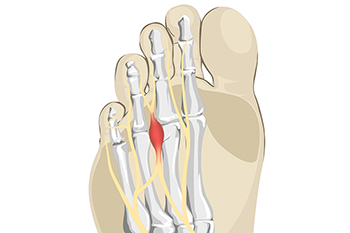
Morton's neuroma is a condition that affects the foot, causing pain and discomfort due to a thickening of the tissue surrounding one of the nerves leading to the toes. This condition typically occurs between the third and fourth toes, and is often described as feeling like there is a small stone or bump in the shoe. The exact cause of Morton's neuroma is not always clear, but it is often linked to repetitive stress or irritation to the nerves in the foot. High heels, tight shoes, and activities that put pressure on the toes, such as running or jumping, can increase the risk. Common signs of Morton's neuroma include sharp, burning pain in the ball of the foot and tingling, or numbness in the toes. The pain may worsen when walking or standing for extended periods. If you have pain in this part of your foot, it is suggested that you consult a podiatrist who can accurately diagnose and treat what may be going on.
Morton’s neuroma is a very uncomfortable condition to live with. If you think you have Morton’s neuroma, contact one of our podiatrists of Ankle and Foot Centers of Missouri, P.C.. Our doctors will attend to all of your foot care needs and answer any of your related questions.
Morton’s Neuroma
Morton's neuroma is a painful foot condition that commonly affects the areas between the second and third or third and fourth toe, although other areas of the foot are also susceptible. Morton’s neuroma is caused by an inflamed nerve in the foot that is being squeezed and aggravated by surrounding bones.
What Increases the Chances of Having Morton’s Neuroma?
- Ill-fitting high heels or shoes that add pressure to the toe or foot
- Jogging, running or any sport that involves constant impact to the foot
- Flat feet, bunions, and any other foot deformities
Morton’s neuroma is a very treatable condition. Orthotics and shoe inserts can often be used to alleviate the pain on the forefront of the feet. In more severe cases, corticosteroids can also be prescribed. In order to figure out the best treatment for your neuroma, it’s recommended to seek the care of a podiatrist who can diagnose your condition and provide different treatment options.
If you have any questions, please feel free to contact our offices located in the Greater Kansas City area . We offer the newest diagnostic and treatment technologies for all your foot care needs.
